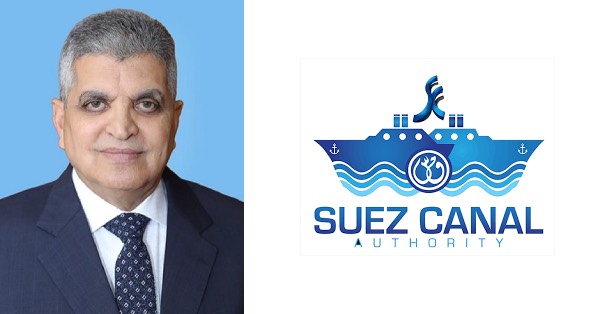The Suez Canal Authority has issued new resolutions on the Suez Canal transit tolls that are to be applied in 2023. Adm. Ossama Rabiee, SCA’s Chairman and Managing Director, has announced today increasing the transit tolls for all types of vessels by 15% during 2023 while that increase is at 10% for dry bulk ships and cruise ships as of the beginning of January of next year.
Adm. Rabiee has confirmed the SCA’s keenness to apply a balanced and flexible strategy on pricing and marketing that serves the its own interest and that of its clients, and that takes into consideration the various changes in global economy through clear mechanisms that include calculating a vessel’s transit tolls depending on the savings it achieves by transiting through the Canal. This systems works with navigational circulars issued and updated by the SCA according to real-time changes for all the categories of transiting vessels which allows for amending the transit tolls effectively in the event of changes the global navigation market witnesses. This eventually allows for providing navigational services for transiting vessels that are in line with the SCA’s standards policy to ensure the Canal’s position at the forefront as the world’s optimal, fastest and shortest route for all clients.
H.E. commented on the increased transit tolls clarifying that they come in light the SCA’s keeping up-to-date with all the market changes in the maritime transport sector which monitor the ever-increasing daily charter rates for most types of vessels that reached unprecedented levels and the forecast for next year shows a continuation in this rise. Clear examples of that are shown in the daily charter rates for crude oil tankers which increased in average by 88% compared to the average rates of 2021, and an increase by 11% in the average daily charter rates of LNG carriers compared to that of 2021.
H.E. added that determining the Suez Canal transit tolls rests on a number of pillars; most significant of which is the average freight rates for various types of vessels. In this regard, there were considerable and consecutive increases within the past period; especially in containerships’ freight rates, compared to those recorded before the COVID-19 pandemic which will be reflected in the high operational profits that will be achieved by navigational lines throughout 2023 in light of the continued impact of the disturbances in global supply chains and the congestion in ports world-wide, as well as the fact that shipping lines have secured long-term shipping contracts at very high rates.
Rabiee pointed out to the impact the increased energy prices have on the equation of tolls calculation where the continued increase in crude oil prices over $90 per barrel, and the increase in the average LNG prices above $30 per million thermal units, have both led to a rise in the average prices of ships bunker and consequently an increase in the savings ships achieve by transiting through the Suez Canal compared to other alternative routes.
H.E. has also stated that the increase is inevitable and a necessity in light of the current global inflation rates that reached more than 8% which translates into increased operational costs and the costs of the navigational services provided in the Canal.
It was emphasized as well that the SCA adopts a number of mechanisms with the sole aim of having its pricing policies cope with the changes in the maritime transport market and to ensure that the Canal remains the most efficient and least costly route compared to alternative routes. The SCA does so through publishing a number of navigational circulars that allow for amending the pricing policies in case of any changes in the navigation market by means of offering incentives to vessels that operate on routes where the Suez Canal wouldn’t normally achieve considerable savings. These rebates may reach 75% of the Canal standard transit tolls for a specific period as per what the market dictates. That is in addition to rebates granted through the SCA’s long haul committee that study each applying vessel’s journey one at a time which may reach 74% of the Canal standard transit tolls according to the conditions of the navigation market at the time the client applies for the rebate, and this also applies to vessels that operate on routes where the Suez Canal wouldn’t normally achieve considerable savings.
The Chairman of the SCA concluded his statement by confirming the Authority’s continuous endeavors towards best supporting its clients and gaining their trust as well as maintaining active communication channels with them. That is in addition to building upon the Authority’s consecutive achievements in dealing with various challenges and managing crisis that were some of the most difficult ones throughout its long history by means of adopting ambitious strategies relevant to developing the navigational services provided to the vessels transiting through the Canal, and taking measures that enable the Suez Canal to carryout its vital role serving global trade.









































